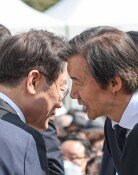More Daechu-ri Arrests May Be Sought
The Public Security Department of the Supreme Prosecutors Office (SPO) announced yesterday that it would carefully decide whether or not to request warrants again for 27 people involved in the Daechu-ri incident. The office had requested warrants for them on charges of obstructing official duties with regard to transfer of a U.S. military base to Daechu-ri, Pyeongtaek, Gyeonggi Province, but the request had been rejected.
An official from the SPO said, We will decide who to request warrants against by identifying how much they were involved in the protests and considering their likelihood of repeating their illegal protests, after thoroughly analyzing the protests where they wielded iron pipes and bamboo sticks.
Prior to this, the Pyeongtaek Branch of the Suwon District Court rejected warrants for 27 out of 37 people the Pyeongtaek Office had requested, saying, They are unlikely to escape or destroy evidence, and issued warrants for only the remaining 10.
Most of the people the prosecution requested warrants for were first offenders and young students who were not involved in the violence actively, an official of the Pyeongtaek Office reported. We issued warrants for those who actively participated in the violent protests or who were involved again in the Daechu-ri protests or those who were deemed as the leadership in the demonstrations.
In regard to this, a prosecution official noted, We ordered the police to summon and investigate executives of the committee against the expansion of the U.S. military base in Pyeongtaek, including father Moon Jeong-hyun, who was on the scene of forceful demolition.
On May 8, the Pyeongtaek Branch of Suwon District Court also investigated the 23 people who got arrest warrants on charges of breaking down iron wires the military had set up, beating soldiers, and waging protests, to decide whether or not to arrest them.
The Ministry of National Defense (MND) reported yesterday that it would apply military criminal law for violent acts that happen in Daechu-ri from now on, and provide soldiers with body armor masks, self-protection sticks and shields to defend themselves.
Minister of National Defense Yoon Kwan-ung said, If groups and individuals are committing violence acts without knowing that military law will be applied to them, they should change their protests from violent to peaceful ones so that their future is not threatened. He stressed, The way to maintain social orders is to bring those who violate the law to justice.
The military is also considering investigating residents of Daechu-ri area to find illegal protesters.
The MND will start to survey the Pyeongtaek land plot this week and devise a master plan for the transfer of the military base with the U.S. military in September, and then begin laying earth on the land in October.
The MND plans to conduct forced demolitions after getting the courts approval if residents who are currently declining to sell their land do not move by late June.
Meanwhile, the Daechu-ri incident has more or less calmed down after two large-scale conflicts. Yet, residents who refused to sell their land clarified their stance that they wouldnt leave their hometown, and candlelit protests against expansion of American military base are spreading in Seoul and Pyeongtaek. So it is expected that the conflicts will be prolonged.
Residents are resolute to fight with the government, risking their lives, if it starts forceful demolitions.







